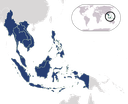Manila Times | Christl Kessler and Jürgen Rüland mentioned in article on populist christianity
The center of gravity in Philippine Christianity is shifting from the hierarchical Roman Church institution to the Pentecostals, evangelicals and charismatics who make up the most exuberant followers of the faith in our country-as they do in the whole of the Global South.
In the rich countries, Christianity is stagnating, where it is not receding. The vaulted churches of Western Europe are virtual museums: they echo only with the shuffle of tourists' feet. But in the poor countries -in Latin America, Africa and Asia-Christianity is bursting with religiosity.
In these continents, the faith has acquired a new relevance to people's lives not too dissimilar from the spirit of the original Christianity. A "church from below" is separating from the "church from above."
Membership in Pentecostal and evangelical churches exceeds 400 million worldwide. And already charismatics make up 11 percent of all Catholics worldwide and 19 percent of Filipino Catholics.
A religion of the here-and-now
In the institutional Church, God is a brief, once-a-week presence in people's lives. The relationship between the individual believer and the Deity is formal and indirect. It is mediated by a sanctified, celibate priesthood and a multitude of saints. And its central teaching is that man's earthly sojourn is a time of trials and hardships. The oppressed and the downtrodden must await their reward in the hereafter.
For the charismatics, Christianity is a religion of the here-and-now, emphasizing worldly over eternal concerns. These new-type Christians -despite their "ideological" and doctrinal differences - share a personalist approach to faith. They regard their relationship with God as an individual and direct connection.
Pentecostal Christians focus on spiritual experience. Their magical world-view rejects much of scientific teaching, but remains alert for the signs and wonders manifested by the Holy Spirit.
Evangelicals-descended from America's Protestant "fundamentalists" at the turn of the 1900s-emphasize the experience of conversion-of "being 'born again' by accepting Jesus as personal savior."
Similarly, Charismatic Catholics "surrender" their lives to Jesus-entrusting to Him their anxieties, fears and longings. Charismatics "filled with the spirit" feel the presence of God "personally, directly and emotionally."
A direct relationship with God
In the charismatic church, God concerns Himself with the everyday struggles of ordinary people. He offers other worldly help for coping with the tribulations of this world.
Catholic charismatics are at best indifferent to the rituals and observances of the institutional Church. Indeed, they often regard traditional religion as obstructing the individual believer's unfettered communion with the Holy Spirit. The Church hierarchy itself they see as elitist, often corrupt, and subservient to foreign Popes.
The Catholic charismatic mass movement El Shaddai ("The God Almighty of Blessings") formally defers to orthodox theological teaching. But its "servant-leader," "Brother Mike" Velarde, speaks of ordinary people's being unable to worship spontaneously because of the "religious bondage" imposed by traditional Church institutions.
A God of everyday anxieties
Over this last half-century, the shocks of rapid change have stirred up this personalist faith from among the poor driven out of their rural niches by agrarian conflicts or pulled into urban slums by the attractions of secular modernity. Four out of every five of El Shaddai's members live below the national poverty line.
Two German political scientists - Christl Kessler and Jurgen Ruland - liken charismatic Christianity in the Philippines to the populist political movements during America's transition from farming to industry.
At that time, political populism gave expression to the anxieties and resentments of traditional people oppressed by social change they believed to be imposed by powerful outsiders. Kessler and Ruland argue that charismatic religion is evoked by the same kind of social change - and reacts in the same way, in its anti-elitism; in its plea for simplicity, and in its reliance on compelling leadership.
Simple solutions for complex problems
What changes is charismatic Christianity likely to make on Philippine religion? Catholic schools still bring up generation after generation of our ruling elite. But the institutional Church is losing its cultural and political influence.
The social gospel of Vatican II- which generated an engaged kind of religiosity in our country, just as it did in Latin America-has given way to an apolitical and simplistic preaching against corruption and misgovernment.
The economic prescriptions of the bishops' conference-typically protectionist and inward-looking-merely play to the interests of the oligarchy.
In South Korea, Pentecostal, evangelical and mainline protestant churches spurred anti-authoritarian political movements beginning in the 1970s. Similar religious and political movements are springing up in Taiwan and China. In our country, the leaders of charismatic mass movements have tried to translate their devoted following into votes.
The leader of the largest protestant charismatic group, "Jesus is Lord," contested the presidency in 2004 and plans to do so again. Velarde himself talks about running in next year's presidential election. But their memberships, turned in to their own problems, have little interest in political affairs.
Charismatic Catholicism is easy to criticize for the simplistic solutions it offers for complex existential problems. But it's harder to shrug off its ability to empower marginal people-to enable them to rise above their helplessness and fatalism; bolster their self-image, and help them adapt to the modern world.
Access the full article via nexis.com
© The Manila Times 2009









